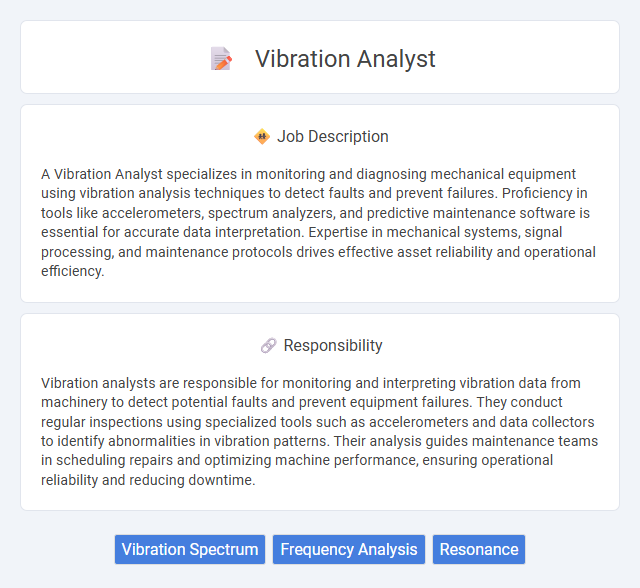
A Vibration Analyst specializes in monitoring and diagnosing mechanical equipment using vibration analysis techniques to detect faults and prevent failures. Proficiency in tools like accelerometers, spectrum analyzers, and predictive maintenance software is essential for accurate data interpretation. Expertise in mechanical systems, signal processing, and maintenance protocols drives effective asset reliability and operational efficiency.
Individuals with strong analytical skills and a keen attention to detail are likely suitable for a vibration analyst role, given the need to interpret complex data and identify machinery issues. Those who prefer routine desk work and have a background in mechanical engineering or industrial maintenance may find this job aligns well with their strengths. However, people who struggle with technical problem-solving or working in industrial environments might face challenges in this position.
Qualification
A Vibration Analyst typically requires a certification such as ISO 18436-2 CAT I or CAT II to demonstrate expertise in vibration analysis techniques and equipment. Proficiency in using portable vibration data collectors and software for data interpretation is essential for diagnosing machinery faults and preventing mechanical failures. Strong knowledge of rotating equipment, root cause analysis, and condition monitoring enhances an analyst's ability to optimize maintenance strategies and improve asset reliability.
Responsibility
Vibration analysts are responsible for monitoring and interpreting vibration data from machinery to detect potential faults and prevent equipment failures. They conduct regular inspections using specialized tools such as accelerometers and data collectors to identify abnormalities in vibration patterns. Their analysis guides maintenance teams in scheduling repairs and optimizing machine performance, ensuring operational reliability and reducing downtime.
Benefit
A vibration analyst job likely offers the benefit of preventing costly equipment failures by identifying mechanical issues early through detailed vibration data analysis. This role may also provide opportunities for skill advancement in predictive maintenance technologies, enhancing career growth potential. Professionals in this position probably experience improved workplace safety and efficiency, contributing to overall operational reliability.
Challenge
A vibration analyst role likely involves complex problem-solving to detect and interpret machinery anomalies through vibration data, presenting ongoing challenges in maintaining equipment reliability. The job may require advanced technical skills and precision to accurately predict failures and avoid costly downtime. Continuous learning and adaptation to evolving diagnostic technologies could be expected to meet industry standards effectively.
Career Advancement
Vibration analysts specialize in monitoring and diagnosing machinery conditions to prevent equipment failures, making them essential in industries such as manufacturing, oil and gas, and aerospace. Career advancement opportunities often lead to senior analyst roles, reliability engineer positions, or managerial roles in maintenance and asset management teams. Gaining certifications like Vibration Analyst Level II or III through the Vibration Institute and developing skills in advanced diagnostic software significantly enhance promotion prospects.
Key Terms
Vibration Spectrum
A Vibration Analyst specializes in interpreting vibration spectra to detect mechanical faults in rotating equipment. By analyzing frequency peaks and harmonic patterns within the vibration spectrum, they identify issues such as imbalance, misalignment, bearing defects, and gear mesh problems. Expertise in spectrum analysis tools and knowledge of machine operating speeds are essential for accurate diagnosis and predictive maintenance.
Frequency Analysis
Vibration analysts specialize in Frequency Analysis to detect machinery faults by examining vibration signals and identifying characteristic frequency patterns linked to imbalance, misalignment, or bearing defects. Utilizing advanced tools like Fast Fourier Transform (FFT) and spectrum analyzers, they interpret vibration data to recommend maintenance actions that prevent equipment failure. Proficiency in analyzing frequency domain data ensures early detection of mechanical issues, optimizing asset reliability and operational efficiency.
Resonance
Vibration analysts specialize in detecting and interpreting resonance phenomena within machinery to prevent catastrophic failures and optimize performance. They utilize tools such as accelerometers and spectrum analyzers to identify resonance frequencies that can amplify vibrations and cause structural damage. Understanding resonance helps these professionals recommend corrective actions like tuning components or implementing damping solutions to enhance equipment reliability.
 kuljobs.com
kuljobs.com